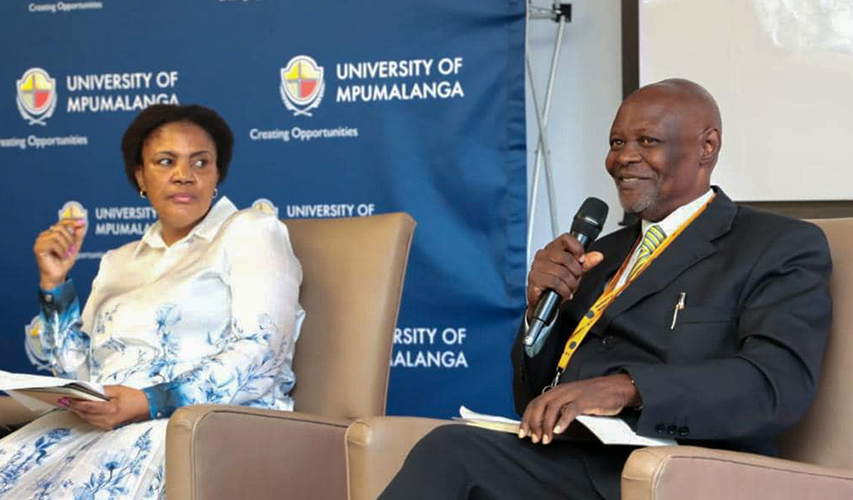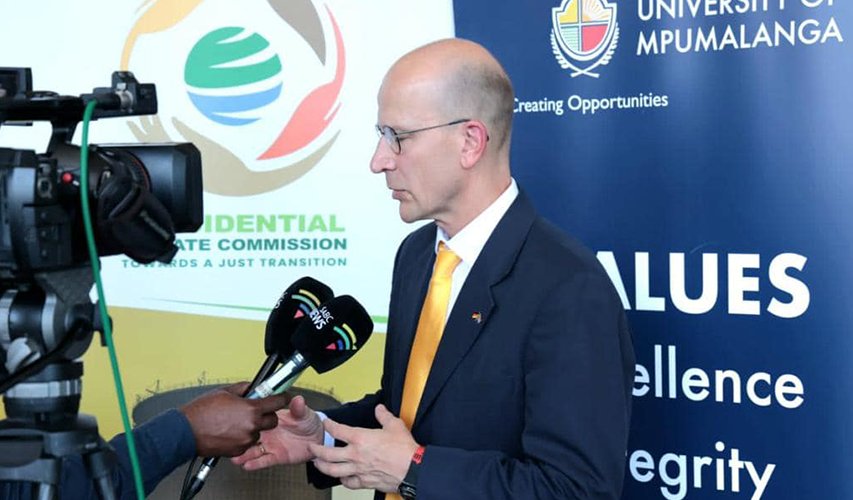The objective was to initiate dialogue within the University community, seeking collaboration to establish a platform for engagement. This platform would explore how UMP can practically contribute to the national discourse on climate change and the just transition through learning, research, and teaching.
UMP Vice-Chancellor, Professor Thoko Mayekiso, stressed the timeliness of the colloquium amid global ecological crises and South Africa's climate challenges, including extreme heat patterns, prolonged droughts, increased flooding, more intense storms, and rising sea levels.
Professor Mayekiso underlined the role of human activity in contributing to these challenges and echoed the PCC's perspective that a well-managed Just Energy Transition can drive new jobs, improved employment, social justice, and poverty eradication.
“We strongly believe that knowledge and skills are key assets to enable effective advancement and deepening of the quality and scope of democratic life in the world. A just transition puts people at the centre of decision-making, especially those most impacted – the poor, women, people with disabilities, and the youth, empowering and equipping them for new opportunities for the future," said Professor Mayekiso.
 The purpose of the colloquium was to initiate dialogue within the University community
The purpose of the colloquium was to initiate dialogue within the University community.
Professor Mayekiso further mentioned that the goal of the University is to make a pioneering, critical, and constructive contribution through the production and dissemination of knowledge.
“We are committed to using the University’s knowledge assets to actively and creatively promote a vibrant economic, social and political democracy in which all sections of society, particularly the poor, can find a meaningful place,” she added.
Addressing the need for partnerships with industry, Professor Mayekiso stressed the importance of linking technological development to the concerns of local communities.
German Ambassador to South Africa, Swaziland, and Lesotho, Mr Andreas Peschke, drew parallels between Germany's industrialized history and South Africa's challenges. He shared Germany's commitment to being climate-neutral by 2045, with plans to phase out coal by 2030.
Mr Peschke positioned South Africa as a leader in green technology, citing the just energy transition partnership between South Africa and Germany as an exemplary model for achieving climate goals while ensuring social and economic benefits.
 German Ambassador to South Africa, Swaziland, and Lesotho, Mr Andreas Peschke.
German Ambassador to South Africa, Swaziland, and Lesotho, Mr Andreas Peschke.
The partnership aims to reduce South Africa's greenhouse gas emissions by 1 to 1.5 Giga tons in the next two decades, emphasizing the importance of a socially just and economically beneficial transition. The gap partnership represents a comprehensive approach to mutual assistance in transforming energy systems to combat climate change.
The panel discussion explored various stages of the just transition, focusing on addressing socio-economic needs and collaborating with learning institutions. Deputy Vice-Chancellor for Postgraduate Studies, Engagement, and Planning, Professor Moses Mbewe, emphasized the importance of higher education institutions in producing graduates who can address the challenges of climate change and transition towards sustainable energy methods.
“It is imperative as a University to produce graduates that are relevant for future jobs and who can deal with this particularly important issue of generating energy using methods that can be sustainable over the future. Thinking in a balanced manner is required so that the country will be able to survive tomorrow,” stated Professor Mbewe.
Cllr. Kenalemang Rose Phukuntsi, Mayor of Tswelopele Local, shared recommendations, including curriculum reform, research, and collaborative initiatives to raise public awareness about the significance of reducing carbon footprints.
She emphasized the need for municipalities to think innovatively and prioritize research and technology to guide decision-making, stating, "Instead of us building the bridges the same way that we used to build in the past, we need to change. But you cannot do that if there is no research; if there is no technology that informs us as to which way to go.”
The colloquium provided a platform for fruitful discussions, highlighting Professor Mayekiso's strong emphasis on knowledge, skills, a just transition, and the University's commitment to promoting economic, social, and political democracy. The event underscored the importance of collaboration, forward-thinking approaches, and a balanced perspective to address climate change challenges.
Story by Lisa Thabethe. Pictures ChrisplPhoto.